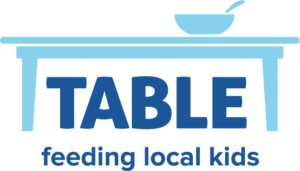
John Coleman, TABLE intern, dives into healthy food relationships and provides tips on fostering healthy food relationships with your children.
Most people realize the importance of making sure kids are getting the right balance of fruits, vegetables, proteins, and overall vitamin-rich foods each day. From picky eaters to snack-loving teens, what and how kids eat plays a significant role in their health and happiness. But, having a healthy diet is only one part of healthy eating for kids. Children also need to learn how to develop healthy food relationships.
What are food relationships? At the simplest form they are our connection with food. I know this may sound strange but yes, everyone has a relationship with food. And, in most cases, our childhood experiences around eating can shape our adult food relationships and how we think about food.
So, what is a positive relationship with food? It’s being able to enjoy the taste, social, traditional, and cultural aspects of food. It’s being aware of how, why, and where we eat. It’s
listening to our bodies for cues of hunger and fullness. And, it’s welcoming all foods without fear or guilt and looking at food as a source of energy, nourishment, and enjoyment.
Fostering healthy food relationships with our kids doesn’t have to be daunting. But, incorporating more mindfulness into our eating practices with our kids can go a long way to fostering their healthy food relationship.
Here are some tips that will help put your children on the road to developing healthy food relationships.
Plan, Prepare and Eat Meals Together
Planning meals and preparing recipes together as a family is a great way to teach your child about nutrition, portion sizes, or reading a food label. This can also introduce kids to new flavors, colors, and aromas. And, enjoying the meal that’s been made together will help to nourish a healthy relationship with food from a young age.
Use Neutral Language to Talk About Food
When talking about food with your kids don’t refer to a certain food as good or bad. Instead, talk about what you like about the food, talk about its textures, flavors, and the way it smells.
Also avoid categorizing food as junk food or unhealthy. This can give kids the feeling of something being “not allowed” and therefore they may over-indulge when they are given that food. Instead, teach them that some foods are good all the time and some are ok just sometimes.
Educate Your Kids About The Food They Are Eating
Talk about what the foods they are eating do to help their body. For example, “blueberries are sweet and tasty, but they also have antioxidants. Antioxidants help our immune system keep us healthy and strong.”
Talking about the food you are eating with your child can also be an opportunity to teach them where their food comes from. For example, while preparing a salad with tomatoes, you can tell them about a local farm that grows tomatoes during the summer.
Teaching kids about the food they are eating can get them excited to try new things, educate them on the benefits of a well balanced diet, and provide the opportunity to learn about the food system.
Avoid Pressuring Children to Eat
Avoid pressuring your child to eat or finish their food, this is especially important during infancy and the toddler years. Pressuring your child to eat more if they are full or not hungry at the moment can teach them to ignore their hunger cues which can lead to unhealthy food relationships. Furthermore, having rules such as a “one bite” rule or a “no thank you bite” can also be harmful to kids. This puts unnecessary pressure on them to try something they may not like and feel like they have to eat for the approval of others.
Don’t Use Food As A Reward
Using food as a bribe or reward for good behavior is tempting. Especially as a reward for eating. For example, “If you eat all of your dinner, you can have a piece of cake.” When you do this, you are giving that food item an emotional connection for your child which can lead to unhealthy eating habits and even overindulgence.
Limit Diet Discussions
Avoid talking about diets in front of or with your child. Talking about weight loss or dieting, even when done in a healthy way, can create a negative relationship with food, exercise, and body image for children.
When we have a positive vocabulary to discuss our relationship with food, we model to children that food and our relationships with food are not meant to be shamed, stigmatized, or looked at negatively. Rather, our relationships with food should be curious, exciting, and nourishing in all areas of our life. We can help kids develop that positive relationship with food simply by using more positive language when we talk about food and removing expectations and rules around eating.
So, what changes are you going to try?

John Coleman